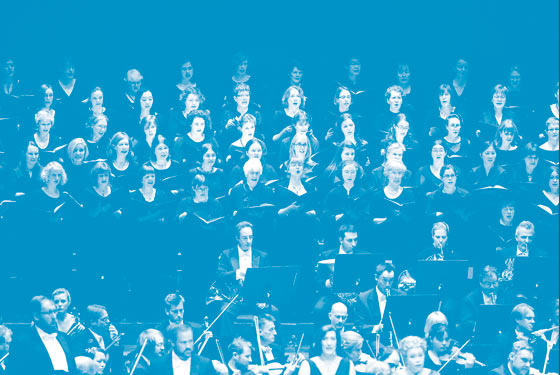
In this season of anti-capitalist discontent, Lincoln Center has been tending to immaterial riches. The White Light Festival has begun its five weeks’ wending through varied spiritual terrain and culminates on November 19 with an evening of Arabic and jazz arrangements of Bach’s Passions augmented by whirling dervishes. Offering a transcendence-oriented music festival may seem a little redundant, like staging a baseball-themed World Series—nudging us beyond our grubby little world is what music is supposed to do—but though the rubric is vague, it embraces pieces of scorching specificity.
Lincoln Center programming chief Jane Moss created the festival last year, and in its second incarnation, she has mercifully skipped the music of Arvo Pärt, whose statement “I could compare my music to white light, which contains all colors” suggested the name. Instead of his mellow raptures and ambient soul-wash, we get works of sinew and fire. The London Symphony Orchestra and Chorus gave vivid performances of Beethoven’s Missa Solemnis and Britten’s War Requiem, each an enormous, chiseled work with an explicit agenda and immense powers of persuasion.
Missa Solemnis is a massive formal proclamation of faith by a composer whose inner life was as expansive and unconventional as his music. Scaled for public concerts rather than church services, the score announced that musicians, not priests or preachers, would henceforth preside over the grandest spectacles of spirituality. The words call listeners to faith; the music calls them to the religion of art. Beethoven seduced and hectored audiences, terrified them when necessary, and had no fear that they might not understand. His marmoreal mass is a formidable work to perform, and it doesn’t disguise its difficulties. In some passages, the soprano barely stops for breath; in others, the tenor climbs into yodeling range. The four soloists mush themselves into a thick paste of sound that has to spring free from the choral and orchestral ooze. It takes a deft pilot to keep it all from drifting into a lugubrious bog.
Fortunately, the hand on the rudder belonged to Sir Colin Davis, who led a performance full of lightness and ferocity. The “Kyrie,” with its dark, brass-tinged chords and stately pace, practically levitated, and the mighty fugue in the “Gloria” spumed. Davis is 84. In June 2010, he was conducting Mozart’s Marriage of Figaro on the night that his wife of nearly 50 years died. Eight months later, he was getting ready to conduct The Magic Flute—Mozart again!—when he fell off the podium and landed hard. It’s been a rough year, and Davis husbands his energies now, sitting on a stool to conduct. But on this night his physical command of the mountainous score was total. The best conductors improve with age, and in recent decades, Davis has surrendered a once self-destructive arrogance, revisited hardened habits, and perhaps come to sympathize more sincerely with the acute sense of mortality that so many composers have had. He has matured from a truculent talent into an artist of awesome sensitivity, a humble advocate for one of music’s most immodest masterworks.
If Beethoven used the Ordinary of the Mass to compete with the church on its own turf, Benjamin Britten adapted the requiem Mass to broadcast his pacifist passions. The War Requiem, which the LSO performed two days after the Missa Solemnis, was written for the rededication of the war-damaged Coventry Cathedral in 1962 and instantly became a symbol of desire for the united Europe that keeps slipping out of reach. Britten welded the Latin text and the poems of Wilfred Owen, who was killed in World War I, to music of great sincerity and splendor. On the podium, Gianandrea Noseda plumbed its cool pathos without ever quite reaching Davis’s levels of exquisiteness. Give him another 40 years or so.
Among Moss’s ambitions for White Light is to create a hipness-and-irony-free zone, and both of the LSO’s concerts felt refreshingly out of step with a time when overtly spiritual music generally tends toward churchy, anodyne choruses or pieces of hushed, exotic mysticism. The orchestra instead brought works of bracing optimism by composers who believed in the power of music to affect the way people hear, think, and behave. I wonder how many members of the enraptured audience at Avery Fisher Hall actually share that touching nondenominational faith.
White Light Festival
Lincoln Center/Various Venues.
Through November 19.
